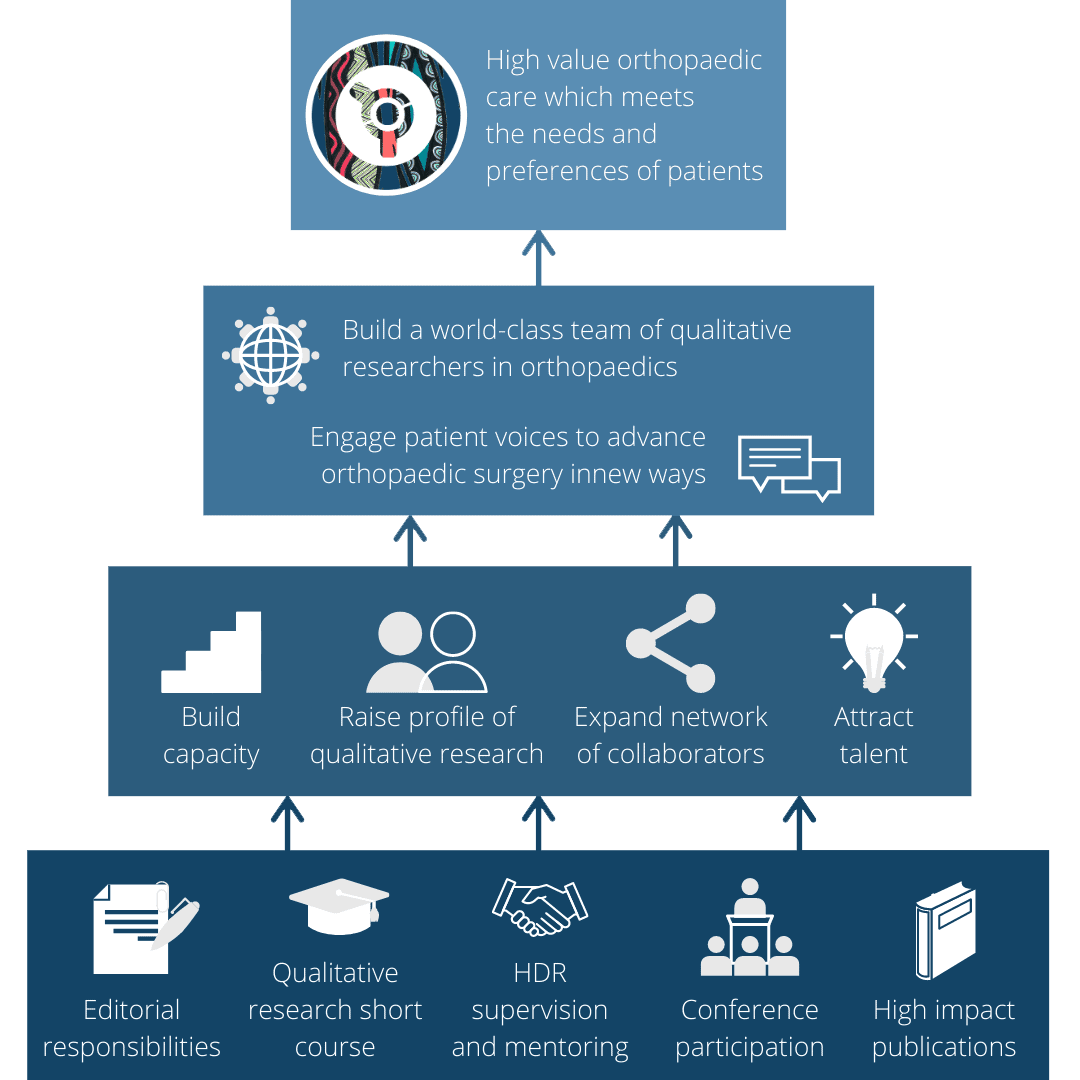what is
qualitative research
Qualitative research explores the reasons, opinions and motivations for the way people behave and is a necessary core component of implementation trials. It is central to understanding why promising interventions do not always work in the real world, and how researchers can design, test and implement interventions that do.
integrating qualitative research at opus
The OPUS program of qualitative research applies robust and innovative qualitative approaches to uncover the experiences, attitudes and beliefs of orthopaedic patients and their clinicians.
The knowledge generated advances orthopaedic care by informing the design and implementation of patient-specific interventions, ultimately allowing the right care to be delivered to the right patient at the right time
- Klem N, Smith A, Shields N, Bunzli S. 2021. Demystifying Qualitative Research for Musculoskeletal Practitioners Part 1: What Is Qualitative Research and How Can It Help Practitioners Deliver Best-Practice Musculoskeletal Care? J Orthop Sports Phys Ther. 51(11):531–532. doi:10.2519/jospt.2021.0110
- Bunzli, S, Taylor, N, O’Brien, P, Dowsey, M, Wallis, J, Choong, P, Shields, N. 2021. How do people communicate about knee osteoarthritis? A discourse analysis. Pain Medicine. 22(5):1127-1148 doi.org/10.1093/pm/pnab012
- Bunzli, S, O’Brien, P, Klem, N, Incoll, I, Singh, J, Davaris, M, Choong, P, Dowsey, M. Misconceived expectations. Patient reflections on the total knee replacement journey. Musculoskeletal care Accepted 10.04.20. doi.org/10.1002/msc.1475
- Klem, N, Smith, A, O’Sullivan, P, Dowsey, M, Schütze, R, Kent, P, Choong, P, Bunzli, S. 2020. What influences patient satisfaction after total knee replacement? A qualitative investigation. Clinical Orthopaedics and Related Research. 478(8) 1850-1866. doi: 10.1097/CORR.0000000000001284
- de Oliveira B, Smith A, O’Sullivan P, Haebich, S, Fick, D, Khan, R, Bunzli, S. 2019. ‘My hip is damaged’. A qualitative investigation of people seeking care for persistent hip pain. British Journal of Sports Medicine 54 (14) doi.org/10.1136/bjsports-2019-101281
- Wallis, J, Taylor, N, Bunzli, S, Shields, N. 2019. The experience of living with knee osteoarthritis: A systematic review of qualitative studies. BMJ Open 9, e030060 doi: 10.1136/bmjopen-2019-030060
- O’Brien, P, Bunzli, S, Ayton, D, Dowsey, M, Gunn, J, Manski Nankervis, J. 2019 What are the patient factors that impact on the decision to progress to total knee replacement? A qualitative study involving patients with knee osteoarthritis. BMJ Open 9, e031310 doi: 10.1136/bmjopen-2019-031310
- Bunzli, S, O’Brien, P, Ayton, D, Dowsey, M, Gunn, J, Choong, P, Manski-Nankervis, J 2019. Misconceptions and the acceptance of evidence-based non-surgical interventions for knee osteoarthritis. Clinical Orthopaedics and Related Research. 477(9) 1975-1983 doi: 10.1097/CORR.0000000000000784
- Lin, I, Bunzli, S, Mak, D, Green, C, Goucke, R, Coffin, J & O’Sullivan, P. 2018 The unmet needs of Aboriginal Australians with musculoskeletal pain: A mixed methods systematic review. Arthritis Care and Research. 70(9), 1335-1347 doi:10.1002/acr.23493
- Bunzli, S, Nelson, E, Scott, A, French, S, Choong, P & Dowsey, M. 2017. Barriers and facilitators to Orthopaedic Surgeons’ uptake of decision aids for Total Knee Arthroplasty: A qualitative study. BMJ Open. 7(11) doi: 10.1136/bmjopen-2017-018614
- Bunzli, S, Smith, A, Schutze, R, Lin, I & O’Sullivan, P. 2017. Making sense of low back pain and pain-related fear. Journal of Orthopaedic and Sports Physical Therapy. 47(9), 628-636 doi: 10.2519/jospt.2017.7434



